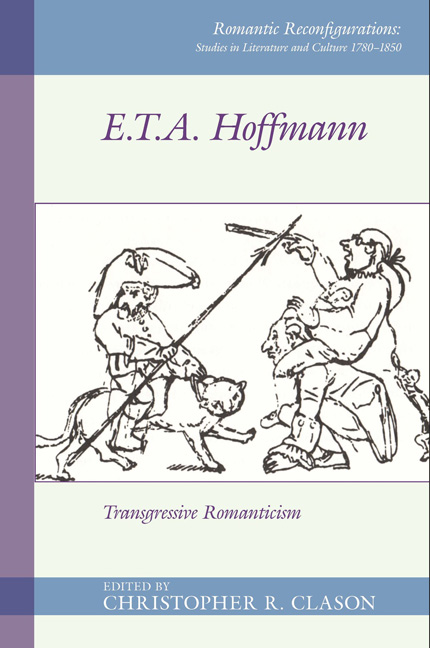Book contents
- Frontmatter
- Contents
- List of Figures
- Acknowledgements
- Notes on Contributors
- Introduction
- I Transgression and Institutions
- II Transgression and the Arts
- III Transgression in the Märchen
- 7 Transgressive Play and Uncanny Toys in E.T.A. Hoffmann's “Das fremde Kind”
- 8 Attending to the Everyday: Idiosyncrasy in E.T.A. Hoffmann's “Der goldene Topf”
- 9 Prinzessin Brambilla: The Aesthetic between Public and Private
- IV Transgression of Reception in Kater Murr
- Works Cited
- Index
7 - Transgressive Play and Uncanny Toys in E.T.A. Hoffmann's “Das fremde Kind”
from III - Transgression in the Märchen
- Frontmatter
- Contents
- List of Figures
- Acknowledgements
- Notes on Contributors
- Introduction
- I Transgression and Institutions
- II Transgression and the Arts
- III Transgression in the Märchen
- 7 Transgressive Play and Uncanny Toys in E.T.A. Hoffmann's “Das fremde Kind”
- 8 Attending to the Everyday: Idiosyncrasy in E.T.A. Hoffmann's “Der goldene Topf”
- 9 Prinzessin Brambilla: The Aesthetic between Public and Private
- IV Transgression of Reception in Kater Murr
- Works Cited
- Index
Summary
E.T.A. Hoffmann's fairy tale “Das fremde Kind” (“The Strange Child,” 1817) is one of Hoffmann's lesser known texts and has received only marginal scholarly attention. The underexamined fairy tale “Das fremde Kind” opens up new insights into Hoffmann's innovative representation of transgressive playfulness, which entails a multifaceted critique of both Enlightenment and early Romantic ideas of creativity and imagination. Hoffmann's fairy tale endorses imaginative ludic experiences because they allow for creative transgressions of societal limitations. However, the text is also a warning against the uncanny dangers of unmediated transgressions into the ambiguous imaginary. The study of ludic elements in “Das fremde Kind” draws attention to its critique of Enlightenment rationalism and philistine materialism with their aversion to imaginary playfulness, and it reveals a late-Romantic critique of the dangers of losing oneself in the fantastic. The tension between the benefits and dangers of transgressive imaginary play is resolved by transposing it into the liminal dream sphere, which offers an unrestricted creative space between everyday reality and the realm of the fantastic.
In Hoffmann's “Das fremde Kind,” artificiality and automation appear as negative principles that threaten transgressive play. The protagonists of the fairy tale are two children, the siblings Felix and Christlieb von Brakel, who receive automated and artificial toys as presents from their aristocratic relatives. Their uncle, Count Cyprianus von Brakel, and his family bring the toys with them from the city when they come for a visit to the idyllic rural village where Felix and Christlieb are growing up. The relatives are accompanied by a hunter, who functions as a servant; this domesticized hunter reflects how far removed the urban relatives are from rural life and nature. Christlieb and Felix are handed the toys by their stilted cousins Adelgunde and Hermann.
The hunter entered with two big boxes; Adelgunde and Hermann took them and gave them to Christlieb and Felix. “Do you love toys, mon cher? here I have brought some of the finest kind for thee,” Hermann said, bowing gracefully. Felix looked discouraged, he became sad; he himself did not know why. He held the box thoughtlessly in his hands and murmured, my name is not Mon share but Felix and also not thee but you. – Christlieb, too, was closer to crying than to laughing.
- Type
- Chapter
- Information
- E. T. A. HoffmannTransgressive Romanticism, pp. 135 - 150Publisher: Liverpool University PressPrint publication year: 2018



